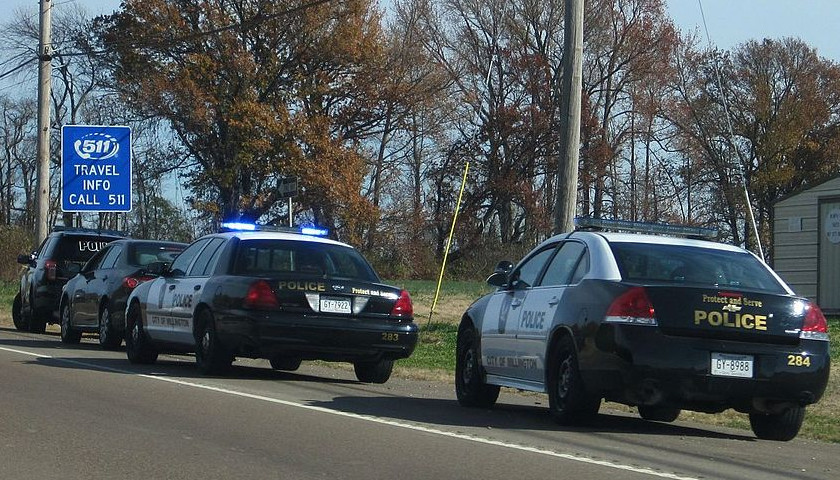NASHVILLE, Tennessee – The House Civil Justice Subcommittee held a summer study of two bills related to civil asset forfeiture reform and reporting, the former having widespread and bi-partisan support although the legislation didn’t make it past its first stop in the Subcommittee.
The summer study was called by Chairman Mike Carter (R-Ooltewah), and attended in part or whole by Subcommittee members Representatives Bill Beck (D-Nashville), Michael Curcio (R-Dickson), Johnny Garrett (R-Goodlettsville), Dan Howell (R-Georgetown) and Debra Moody (R-Covington). Representative Joe Towns (D-Memphis) was not in attendance for any of the proceeding.
The agenda included HB 0340 sponsored by Representative Martin Daniel (R-Knoxville) and HB 0862 by Representative Justin Lafferty (R-Knoxville).
Since elected to the 109th Tennessee General Assembly, Representative Daniel has sponsored bills relative to reforming civil asset forfeiture laws in the state.
HB 0340 has 39 House co-sponsors which, notably, doesn’t currently include any member of the Civil Justice Subcommittee.
Civil asset forfeiture is a law enforcement tool that permits private property to be seized and retained if it is suspected to have been involved in criminal activity. The private property can go on to be forfeited, however, without a criminal conviction or even criminal charges being filed.
Legally, civil asset forfeiture is considered a proceeding against the property. As such, even indigent people are not eligible for a public defender as they would in a criminal proceeding.
A federal program known as “equitable sharing” allows local law enforcement agencies through either “adoption” or a joint effort with the federal agencies to transfer seized assets to the federal government for processing. With case of either adoption or joint effort, equitable sharing circumvents any state laws regarding civil asset forfeiture.
Any and all proceeds through civil asset forfeiture are retained by Tennessee state and local law enforcement agencies.
As reported by The Tennessee Star, Representative Daniel’s bill, through a series of amendments, would:
- Require the local district attorney general to examine the facts underlying each seizure and, if the facts do not reveal that the property was taken per probable cause to connect the property to a crime/criminal activity, the district attorney may file a motion to dismiss the case;
- Close the “equitable sharing” loophole to prevent Tennessee law enforcement agencies from circumventing state law by handing the seized property over to federal agencies for processing under the federal laws which may not have the same due process protections;
- Increase the burden of proof that must be shown to connect the property to a crime from a mere preponderance of the evidence – 51 percent likelihood – to a showing of clear and convincing evidence – 75 percent likelihood.
- Eliminate the bond that must be posted by the property owner who wants to “recover” their seized property from law enforcement at a cost of $350, Tennessee being one of just three states to have such a requirement.
- Exempt cash less than $1,000 and vehicles worth less than $2,000 from seizure.
The Tennessee Advisory Committee to the U.S. Commission on Civil Rights addressed “The Civil Rights Implications of Tennessee’s Civil Asset Forfeiture Laws and Practices” in a February 2018 report of the same name.
The report’s letter of transmittal said that the civil asset forfeiture laws enacted twenty years ago had laudable goals, but as written and applied by state officials fall short of the goals in several respects and “raises significant civil rights concerns regarding the fair and equitable administration of justice.”
The letter and report found:
- There is a lack of many procedural safeguards commonplace in other states
- Tennessee is one of only three states in that nation that require a property owner to post a cash bond before being permitted to contest the legality of a forfeiture
- Limited judicial oversight
- No right to legal counsel
- Disparate impact on low-income individuals and communities of color
- Law enforcement agencies being permitted to retain for their own use 100 percent of the cash, private property and proceeds forfeited provides for perverse financial incentives and encourages abuse
- Minimal oversight as to how forfeited assets are used or spent by law enforcement agencies
- In practice, a primary purpose is to augment local law enforcement budgets without the need to seek funding from a legislative body through the standard public budgetary process
- Abundant evidence that Tennessee’s civil asset forfeiture laws do not adequately protect the rights of innocent property owners
Representative Daniel’s proposed legislation seeks to address these findings.
When the summer study got underway, a few minutes after the 9 a.m. scheduled start time waiting on members to arrive through Nashville’s infamous traffic, it was before about 30 people, the majority of whom were law enforcement related.
Chairman Carter sponsored HB 2021 which became Public Chapter No. 772 , most of which took effect only about a year prior on October 1, 2018. The legislation made notification and allowance to appear in court requirements for “innocent owners” of property and required that attorney’s fees of not more than $3,000 be awarded if the administrative law judge ordered the property to be returned.
In his 2018 legislation, Chairman Carter addressed some of the issues he included as part of his testimony to the Tennessee Advisory Committee to the U.S. Commission on Civil Rights. He has since, however, seemed reluctant to address the final concern he offered in that testimony in which he “wanted to increase the burden of proof from the simple scintilla, 51 percent civil, up to clear and convincing in those [forfeiture] hearings.”
Chairman Carter, who wanted testimony to focus on civil asset forfeiture in the state after the passage of his 2018 legislation, otherwise offered remarkable deference to Representative Daniel to run his portion of the meeting.
Representative Daniel started off with a 31-slide presentation that reviewed relevant terms, current Tennessee statutes, civil asset forfeiture reform efforts across the country in both red and blue states with support on both sides of the aisle, recent significant legal cases on the matter, as well as numerous statistics relative to assets forfeited in the state. For example:
- Currency forfeited in Tennessee totaled in excess of $136 million from 2009 to 2018, averaging $15 million per year
- Equitable sharing forfeitures from 2014 to 2018 totaled nearly $42 million with $20 million of that coming back to Tennessee
- In 2018, in addition to the $15 million in currency forfeited, there were 2,106 vehicles, 386 firearms, 256 computers.
- Of the 6,620 cases that resulted in forfeiture in 2018, 5,005 cases – 75.6 percent – were done by default.
- The average size of a forfeiture in 2018 was $2,234.
- The state’s 23rd Judicial District Drug Task Force forfeitures in 2018 totaled between $3.1 and $4.3 million, depending on the data source. Meanwhile, all of the state’s 31 Judicial Drug Task Forces totaled somewhere between $5.2 and $7.6 million.
Representative Daniel called his first witness, Jennifer McDonald, a senior research analyst at the Institute for Justice (IJ), a non-profit public interest law firm that lobbies and litigates across the nation to end civil asset forfeiture and replace it with criminal forfeiture.
In IJ’s 2015 “Policing for Profit” nationwide forfeiture study, Tennessee earned a D- for having some of the worst forfeiture laws in the country, said McDonald.
McDonald told the Subcommittee, “What we know about civil forfeiture under Tennessee law is that it is not targeting the drug traffickers it is intended to target.”
For one, said McDonald, the majority of forfeitures are in the $500 to $600 range, although the data is somewhat out of date as IJ has been seeking to get it from the state’s Department of Safety.
Compared to Representative Daniel’s figure of $2,324 as the average amount of all forfeiture amounts and skewed by some very large amounts, McDonald explained that the median is right in the middle of the whole list of forfeiture amounts.
McDonald pointed out that it’s hard to find evidence that seizures are necessarily associated with drug trafficking or other criminal activities, especially when it’s not a criminal activity to carry cash in such small amounts.
Those people without bank accounts, including minorities and the elderly, carry cash and such practices may unfairly target those individuals, advised McDonald.
By prohibiting the seizure of cash of less than $1,000 and vehicles less than $2,000, HB 0340 would address this, said McDonald.
The $350 cost bond is also a barrier for low-income individuals on top of navigating the system without an attorney, a process that may be “too daunting and burdensome” for many people to go through, according to McDonald.
The process also lacks the due process afforded under both the U.S. and Tennessee Constitutions, McDonald said, because a judge does not sign off on a preponderance of evidence standard.
With regard to Representative Daniel’s proposal to limit equitable sharing for seized property valued at less than $20,000, McDonald advised IJ research shows that would reduce those cases. Consistent in Tennessee and throughout the country, when the threshold is set a little higher at $25,000, research shows the cases are reduced by 65 percent. With only 10 percent of the equitable sharing proceeds coming from that threshold, it allows the focus to be on serious federal offense crimes and law enforcement wouldn’t lose as much in proceeds, according to McDonald.
She also suggested improved reporting requirements to include whether there was a conviction in association with the civil asset forfeiture to really help evaluate the efficacy of the forfeiture program in fighting crime.
A study earlier this year that looked at equitable sharing data and whether it actually fights crime, found no statistically significant relationship with equitable sharing and crime rates, relayed McDonald.
She went on to say that what they did find is that cities and states hit harder by economic times like higher unemployment, higher instances of equitable sharing forfeitures were also found. McDonald says the findings suggest that when budgets are constrained, civil forfeiture is turned to which bears out with other research.
McDonald also recommended reporting the specific location of where the property was seized, especially in light of stories that exposed Tennessee law enforcement’s policing for profit behavior.
Along I-40, law enforcement interested in stopping illegal drug trafficking would be expected to intercept the drugs heading eastbound before they can be sold and distributed, said McDonald. However, agents call westbound “the money side,” and a multi-year investigation found that 9 of 10 stops occurred in westbound lanes of I-40.
This paints a picture that suggests that agents are more often motivated by profit than protecting the public, summarized McDonald.
At the conclusion of her testimony, Subcommittee members grilled McDonald, starting with Representative Garrett questioning the reliance on the amounts of the money seized and the “stories” McDonald alluded to.
McDonald responded that the seized amounts when they are not affecting crime-fighting, suggests money may be the motivation. The stories she referred to were, in fact, investigative news reports, alluding to the award-winning series by WKRN’s News Channel 5.
Representative Garrett reiterated a scenario he presented earlier to Representative Daniel about a tractor-trailer loaded with cars, pulled over for a lawful stop. A K9 was called out lawfully, hits on one of the cars and $100,000 worth of cocaine was found in the trunk of one of the cars, although there is no reason to believe the driver is connected to the drugs.
With no conviction, the drugs would be allowed to continue on their way, Representative Garrett posed. He then asked, “Tell me why my analysis is wrong,” that law enforcement cannot seize those drugs.
McDonald responded, “Law enforcement can absolutely seize those drugs because they are illegal drugs under federal law.” Because they are contraband, civil forfeiture is not even needed to seize the drugs and would not be subject to the proposed limitations of the equitable sharing program, advised McDonald.
The questions and answers continued for a lengthy period and seemed to stem from confusion on the differences between seizure and forfeiture, the standards of proof related to seizure and forfeiture as well as the difference in how assets with legal value – such as cash and vehicles, are treated versus those with illegal value, such as drugs.
Ideally, a criminal conviction would be required in connection with the forfeiture of assets with legal value – cash and vehicles, but that is not being proposed as part of the subject legislation, McDonald clarified.
Representative Daniel’s second witness, Frank Lannom, was a Lebanon-based attorney who has spent a significant amount of time on forfeiture cases.
His compelling testimony detailed how the civil asset forfeiture process truly works in practical application – or doesn’t – as he says “the process is broken.”
For the purposes of contrast, Lannom first gave a short explanation of how a legal process would work between two individuals, one of whom is wanting to take something from the other. He then concluded, “It’s not perfect, but it works.”
Lannom then set up a realistic scenario and detailed the ways the civil asset forfeiture process is broken.
Lannom focused much of his demonstration of the broken process by presenting that the state’s Department of Safety – as the opponent in these matters – seizes the property, is the initial decision-maker on how many $350 cost bonds are to be paid, determines whether a “pauper’s oath” is legitimate to waive the cost bonds and processes the case including setting the date conducive to their schedule and determining whether the paperwork was completed properly.
Lannom also pointed out that the $350 cost bond must be paid for the property owner just to get the specifics on why the property was seized and to begin the administrative process that must then be navigated.
While painting the picture as Representative Beck described, as a “stacked deck,” the questioning of attorney Lannom was more of a dialogue and noticeably different in tone to that of IJ’s McDonald.
By state statute, the Department of Safety sets the rules that implement the laws passed by the legislature, said Lannom. Chairman Carter responded in an initial sign of openness to further forfeiture reforms, “Maybe we need to talk to Government Ops about those rules.”
Chairman Carter questioned what the Department of Safety wins or loses. While not vilifying the Department of Safety, Lannom offered, “They are charged with winning and they are charged with writing the rules and proceedings. They have been given a job and all of the power and the combination brings the inappropriateness of the process.”
Representative Beck brought up the new provision to cover attorney’s fees up to $3,000 in Chairman Carter’s reform bill from 2018, which Beck said leveled the playing field.
After further exchanges on attorney’s fees, Lannom concluded he wouldn’t take a contested administrative process case for the $3,000 limit and he doubted Chairman Carter – a former attorney – would either.
Representative Garrett, in another sign of potential willingness to look at improvements to the law, asked if someone had their assets wrongfully taken, why there would be a cap at all on attorney’s fees. He added that he wouldn’t have a problem if the award was cost plus an additional factor.
Representative Daniel thought Representative Garrett had a good point and added that if seizing agents were subject to unlimited attorney’s costs and fees, they would be much more careful in their seizure and forfeiture proceedings.
While the bill and amendments being considered don’t make changes to those provisions, Representative Daniel said that it is something that should certainly be addressed next year.
The next witness was Nashville attorney Ben Raybin, who successfully represented the appellant before the state Supreme Court in the State of Tennessee v. Sprunger case, one that Representative Daniel earlier referenced as significant relative to civil asset forfeiture.
Representative Daniel said about the Sprunger case in his presentation that the Supreme Court of Tennessee held that “forfeiture or confiscation is a proceeding of a harsh nature.”
While forfeiture is permissible, it is not favored under the Tennessee Constitution. Statutes authorizing forfeiture are to be strictly construed. The state’s failure to prove its compliance with the procedural requirements of the forfeiture statutes required the court to vacate the forfeiture in the Sprunger case, Representative Daniel presented.
In his persuasive testimony, Raybin told the Subcommittee about the problems he has encountered with the civil asset forfeiture process including and beyond the Sprunger case.
Among Raybin’s concerns with attorney’s fees is if a case settles, fees are not awarded. An attorney has an ethical duty to recommend to a client the guaranteed result of getting their property back, even if Raybin considered it to be a good case, in the hopes of being awarded attorney’s fees.
A Memphis attorney for 14 years primarily focused on criminal defense and seizure work, Justin Gee testified that he has three concerns.
First, he explained the cost barriers to recovering seized assets between the cost bond and attorney fees.
Timing was the second issue Gee cited, explaining the extended time it takes for him as an attorney with his staff to get through the process.
Third, Gee said that seizure laws have good intentions and are needed but, like many things, there is abuse. While he wouldn’t go into specifics, Gee was convincing in saying that even in criminal cases law enforcement is more concerned with money than prosecuting the case itself.
Gee said he knows law enforcement has a number in mind when it comes to forfeitures.
Bellevue criminal defense attorney Mike Flanagan, who said he’s been around a long time, was realistic about the cost bond, when he said “It’s a fee.” He recommended doing away with it and focusing on more important things.
Flanagan said that when the Drug Task Forces came in he saw abuses, but being fair, he thought it has improved. Even with better training and education, there are still problems in the process that isn’t fair to poor people.
Flanagan thought that eventually there won’t be any civil forfeiture, predicting that 50 years from now all forfeitures will be criminal.
In his 40 years of experience, the drug business has changed with mules being paid $400 or $500 and sent out on I-40. When the mules get caught, they are charged with money laundering, sit in jail four or five days before making a deal saying they don’t know whose money, thereby forfeiting it.
From Flanagan’s anecdotal observations and admittedly without statistics, he sees too many seizures on the westbound or “money side” of I-40.
Following about three hours of testimony and an hour lunch break, representing the state’s Department of Safety, Elizabeth Stroecker, Legislative Director and General Counsel, Liz Hale, Deputy General Counsel and Matt Perry, Lieutenant Colonel, Tennessee Highway Patrol (THP) came forward to sit at a table together.
Stroecker, who directed the testimony, said she tried to take notes to address Representative Daniel and earlier witnesses, but added, “There is more than enough help,” looking behind her, “with most of the Department there to answer any questions.”
The testimony jumped around to address what was said in the morning session, beginning with the $350 cost bond.
Hale said it was set at $350 in 1993 or 1994 and hasn’t changed since that time. The Department’s legal division uses the money to cover the $200 cost of setting a case with the Administrative Law Judge and to help pay for court reports so that there is a transcript available for appeals.
Eliminating the cost bond, while widely recommended, would likely result in a fiscal note of $300,000 to $500,000 that Stroecker estimated was received from the cost bond.
The Department pays the Secretary of State approximately $720,000 per year for the Administrative Law Judge for the forfeiture hearings, so the cost bond covers only a fraction of the cost, said Stroecker.
Representative Curcio said that too often the legislature uses fees to fund various departments, and that at some point it will need to be decided if law enforcement is going to be fully funded. He felt that the Department of Safety was in the position of having to defend the cost bond they didn’t establish.
Of the things they were hearing in the meeting, elimination of the cost bond seemed to make the most sense to Representative Curcio.
“If we to want to have a discussion about eliminating something, then let’s just figure out how we want to pay for it instead of tacking these fines and fees onto folks as they come through the system,” suggested Representative Curcio.
Representative Garrett asked for the forfeiture process to be detailed, especially in light of the 2018 revisions. The explanation was handled by Hale, including the rights now afforded to innocent owners of property who previously had no notice of the seizure or a right to appear.
Hale did confirm to Representative Garrett’s questioning that it’s at least a month and a half before a hearing is set.
Several examples were given of vehicle stops where thousands of dollars were found, since THP was trained, the drivers were allowed to leave with their cash whether or not citations were issued.
Perry said that from the THP perspective, cash and property doesn’t really mean anything to them, the whole goal is taking down the highest possible criminal organization. He said that mules are given enough money for food, gas and hotels to get across the country and can be stopped with two kilos of cocaine and $1,500 cash to commit the crime and sometimes that’s what they are seizing.
Stroecker said that the value of property such as a vehicle, as proposed in one of Representative Daniel’s amendments, may not be calculable by THP on the side of the road.
With regard to federal cases being adopted under equitable sharing, Stroecker said that of the 4,000 opened cases, only 64 were adopted of which 31 were related to drugs and 20 related to human trafficking.
When Representative Garrett posed his drug-containing car-carrier scenario to the panel, Stroecker agreed with him that under the proposed amendment specifying that the vehicle, if valued below $20,000, couldn’t be transferred to the federal level.
Representative Daniel disagreed, saying that it does not impact in any way the seizure of the vehicle in the field, but only concerns potential handover of assets to a federal agency.
After about an hour of dialogue with the Department of Safety, Johnny Carter with the West Tennessee Drug Task Force came forward to testify. He said that since the changes took place in 2018, alluding to Chairman Carter’s legislation, they changed the protocol to do more detailed investigations before making seizures and admitted that they have not seized a lot of property that they probably would have before the changes.
Representing the Sheriff’s Association, Dickson County Sheriff Jeff Bledsoe and lobbyist Mike Agee came forward.
Agee said that in his tenure with the association, every time that there has been a situation that exposed a loophole, they worked diligently to correct it and will continue to do so. He said that as a result of the actions the body had taken, they are doing things differently today than five years ago.
Sheriff Bledsoe said that prior to the change, a different path may have been taken, but now if there is any doubt or question, those cases don’t move forward. He said they want to make sure they’re not putting anything negative on the table and want the nation to look at Tennessee and say we’re on the right path.
District Attorney General of the 18th District, which encompasses Sumner County, Ray Whitley said that since he was elected in 1980, he has seen a lot of changes including the establishment of drug task forces, which started in Sumner County.
Whitley said that the 2018 reforms got everyone’s attention and he doesn’t see anything additional that needs to be done from a prosecutor’s standpoint.
Representative Daniel said that oversight authority from the attorney’s general he has proposed was a request by one of Whitley’s colleagues.
Whitley responded that they are very much against that and don’t have the manpower to do it. He also spoke against changing the burden of proof from “preponderance” to “clear and convincing,” saying it’s difficult for the officer to determine in the stress of the roadside situation.
TBI’s Senior Policy Advisor Jim Musice gave relatively short testimony, saying that their role is fairly limited, with nearly 100 percent of their 2017 cases coming out of the drug division almost exclusively with the federal government under equitable sharing.
Equitable sharing, said Musice, is a bit of an oxymoron to those in law enforcement, because it can be as low as two percent and as high as 40 percent.
Of their 78 cases, $324,000 was TBI’s share, which is not small, said Musice, but it is not their motivation, which is justice.
In the wrap-up opportunity Chairman Carter gave the bill sponsor, Representative Daniel said he appreciated that law enforcement came before them and said they are more careful. His concern is for the 7,000 people who had an average of $2,000 seized and forfeited who were not involved in drug trafficking and criminal activity.
While he wants to stop the criminal activity, Representative Daniel also wants to protect those who don’t have access to banking facilities and carry around a lot of cash.
Representative Curcio thanked Daniel for the extensive work, but wanted to address the seizures within the 23rd Judicial District. Having obtained information from District Attorney Ray Crouch, Representative Curcio said that the there is a long stretch of I-40 and that the figures are accurate but that they represent broader criteria.
Representative Daniel indicated that the figures might cover three to four years, but that would be the case with any figures that were cited.
He agreed that there is a long stretch of I-40. But, Representative added, there is more that goes through other counties and that “there is no question that the 23rd Judicial District is a very active forfeiture program.”
With the discussion on HB 0340 concluded, Representative Lafferty came forward to discuss his bill that he said is a little simpler and does not look to change the world, but to get more information from the Department of Safety.
The Department of Safety panel came forward again as Chairman Carter reviewed each specific piece of information Representative Lafferty was seeking in an effort to determine if the Department of Safety already reported the data, had access to the data but wasn’t currently reporting it, if the data was available but not maintained in the system or if the data was not collected.
After about five hours, Chairman Carter adjourned the meeting without any actions or decisions taken, as required of summer study.
HB 0340, with several amendments, and HB 0862 are expected to be taken up when the legislature is back in session beginning January 14, 2020.
The full proceedings of the House Civil Justice Subcommittee can be watched here.
– – –
Laura Baigert is a senior reporter at The Tennessee Star.









Has this extensive study produced a “Post Enactment Audit/Evaluation’ of PC 772?. It has been in effect for less than two years. Such an assessment should be an essential part of any consideration of more legislation on same subject.
Before charging off on additional significant changes, we should objectively assess PC 772’s effect after giving it a chance to work.
Do we perhaps have new legislation looking for a problem to solve, when we overstate the problem?